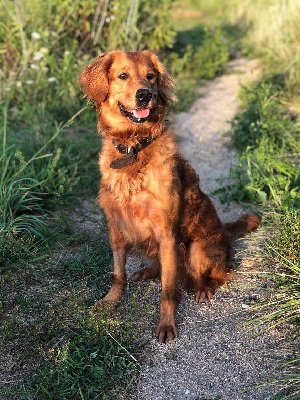MCT Journey
"Rocket" The Fighter
* 11-18-2013
† 09-06-2022
It is always with sadness when you have to make a final decision, but we had to say goodbye to Rocket from our 2013 Essex & Ranger litter. We would like to take the opportunity to share some more information with you.
In March 2021, Rocket developed a mast cell tumor on her right front paw and the tumor was finally removed at the beginning of June after an odyssey of going through different clinics and some initial medical treatment. We decided against amputation of the whole leg as that would not have allowed Rocket a continued great quality of life as an active field golden retriever, but they removed digits 2 and 3. This tumor had been graded on the lower scale of 2 (with mast cell tumor grade 1 being regarded as low and 3 as high/aggressive). Rocket was eager to come back to active field work at the end of August and passed another Master test at the end of September.
Unfortunately, more tumors developed in the fall of 2021, which were removed at the end of November. Those tumors were graded 2 and 3. Recovering from this surgery, Rocket celebrated her 2nd come back to running hunt tests in January of 2022 and continued successfully until I retired her after her last test in mid-August 2022. In the last months, more tumors appeared and unfortunately started metastasizing into her lymph nodes.
During her final year, Rocket had been on many different medications for cancer treatment (including IV chemo treatment), which helped her maintain her thrive, deep desire to bond with her family, and, most importantly, her happiness. Up until a few days before we decided to let her go, Rocket still wanted to be active, and she was full of life. I’m grateful that despite her progressive condition she did not suffer.
Rocket was a hero of the Morris Animal Foundation Golden Retriever Lifetime Study and We are glad she was part of that community. We are convinced Rocket’s contribution to the research will help to better the understanding of this disease. The causes of mast cell tumors are still poorly understood. We discussed with her oncologist about getting her tested for the c-kit mutation, the only known genetic cause that has been shown to have a high correlation with dogs developing mast cell tumors. As a breeder, we are concerned about any heritable causes of diseases and other health concerns that could potentially impact her siblings and offspring. The oncologist explained that c-kit mutations are in fact somatic mutations, not germline mutations, which means that even if Rocket had the mutation, there is no increased risk for a relative to also have it compared to random chance. C-kit mutations are not heritable, fortunately. Due to the nature of the surgeries and the logistics involved, it was not feasible to test Rocket for the mutation, but if she had had it, she specifically would have responded to one certain type of treatment - which she did not.
Unfortunately, mast cell tumors are still a big mystery for canine science, but they are not correlated with an increased risk of other cancers or diseases neither in the same dog or dogs closely related to it.

We were very fortunate to get 18 more months of a great quality of life after her initial diagnosis, significantly more than the median survival time for this type of cancer.
